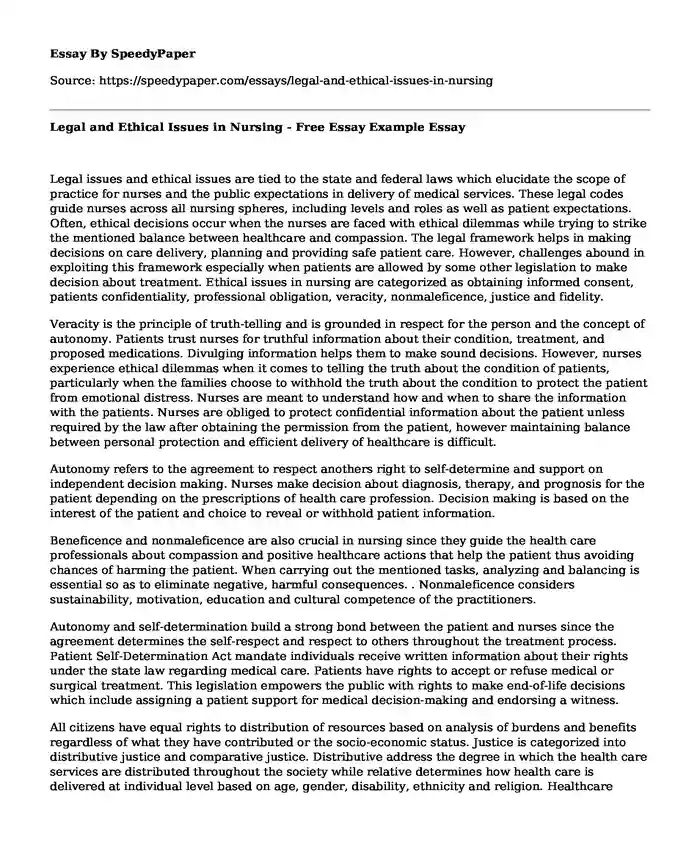
| Type of paper: | Essay |
| Categories: | Health and Social Care Nursing Law Ethics |
| Pages: | 3 |
| Wordcount: | 638 words |
Legal issues and ethical issues are tied to the state and federal laws which elucidate the scope of practice for nurses and the public expectations in delivery of medical services. These legal codes guide nurses across all nursing spheres, including levels and roles as well as patient expectations. Often, ethical decisions occur when the nurses are faced with ethical dilemmas while trying to strike the mentioned balance between healthcare and compassion. The legal framework helps in making decisions on care delivery, planning and providing safe patient care. However, challenges abound in exploiting this framework especially when patients are allowed by some other legislation to make decision about treatment. Ethical issues in nursing are categorized as obtaining informed consent, patients confidentiality, professional obligation, veracity, nonmaleficence, justice and fidelity.
Veracity is the principle of truth-telling and is grounded in respect for the person and the concept of autonomy. Patients trust nurses for truthful information about their condition, treatment, and proposed medications. Divulging information helps them to make sound decisions. However, nurses experience ethical dilemmas when it comes to telling the truth about the condition of patients, particularly when the families choose to withhold the truth about the condition to protect the patient from emotional distress. Nurses are meant to understand how and when to share the information with the patients. Nurses are obliged to protect confidential information about the patient unless required by the law after obtaining the permission from the patient, however maintaining balance between personal protection and efficient delivery of healthcare is difficult.
Autonomy refers to the agreement to respect anothers right to self-determine and support on independent decision making. Nurses make decision about diagnosis, therapy, and prognosis for the patient depending on the prescriptions of health care profession. Decision making is based on the interest of the patient and choice to reveal or withhold patient information.
Beneficence and nonmaleficence are also crucial in nursing since they guide the health care professionals about compassion and positive healthcare actions that help the patient thus avoiding chances of harming the patient. When carrying out the mentioned tasks, analyzing and balancing is essential so as to eliminate negative, harmful consequences. . Nonmaleficence considers sustainability, motivation, education and cultural competence of the practitioners.
Autonomy and self-determination build a strong bond between the patient and nurses since the agreement determines the self-respect and respect to others throughout the treatment process. Patient Self-Determination Act mandate individuals receive written information about their rights under the state law regarding medical care. Patients have rights to accept or refuse medical or surgical treatment. This legislation empowers the public with rights to make end-of-life decisions which include assigning a patient support for medical decision-making and endorsing a witness.
All citizens have equal rights to distribution of resources based on analysis of burdens and benefits regardless of what they have contributed or the socio-economic status. Justice is categorized into distributive justice and comparative justice. Distributive address the degree in which the health care services are distributed throughout the society while relative determines how health care is delivered at individual level based on age, gender, disability, ethnicity and religion. Healthcare Justice helps to solve stress on overburden healthcare systems and also offers opportunities for making ethical decision about workforce allocation and equitable distribution of financial resources.
End-of-life care is also an ethical concern for nursing fraternity .According to this provision, the nurse are obliged to help a patient to die with dignity and comfort. Nurses should evaluate the health needs of their patients before determining the level the level of care required .Communication is especially face to face is the best to enable the nurse to ask the right questions and determine the courses of action. The mentioned requirement, however, is pose a challenge to nursing practitioners, especially in caring for a person who is showing little signs of survival.
Cite this page
Legal and Ethical Issues in Nursing - Free Essay Example. (2019, Aug 29). Retrieved from https://speedypaper.com/essays/legal-and-ethical-issues-in-nursing
Request Removal
If you are the original author of this essay and no longer wish to have it published on the SpeedyPaper website, please click below to request its removal:
- Essay Sample on the Cultural Context of Understanding
- Essay Example on a Cluster Differentiation Antigen Expressed on the Immune B Cell
- Essay Sample on Russian Intervention in Syria
- Free Essay with a Critical Analysis of The Once Were Warriors Movie
- Free Essay: Root Causes of Chiquita's Actions in Colombia which Led to Their Conviction
- Free Essay: Is It Possible for Al to Contribute Successfully to Economic Growth in the United States?
- Health Systems - Enhancing Global Health Services: Essay Sample
Popular categories




